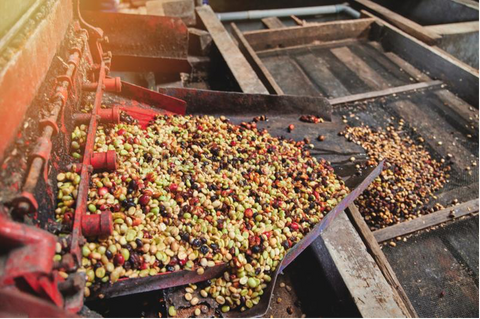From variety, to roast level, to origin, there are endless options to consider when it comes to choosing coffee. For many coffee professionals, the single most important contributing factor to a coffee’s flavor profile is the method by which it was processed. In our opinion, it doesn’t get any better than honey processing. If you haven’t already, you should be adding honey processed coffees to your lineup. Read on to learn why!

What is honey processed coffee?
To understand what honey processing is, it’s important to know exactly how “coffee processing” works.
The roasted coffee beans that we’re all familiar with are actually seeds of the coffee cherry– they’re not actually “beans” at all. Once picked, the fruit of the cherry has to be stripped away in order to get to the seeds themselves. The process of removing the coffee cherry fruit and preparing the raw, unroasted coffee (also called “green coffee”), is what is broadly referred to as “coffee processing.”
There are several ways of processing coffee. The two most common are the “natural process” and the “washed process.”
Naturally processing coffee is the oldest and most traditional method used. Today, there are many innovative ways to naturally process coffee to achieve different flavor profiles. In its most basic form, coffee cherries are simply laid out on large patios or raised platforms to slowly dry in the sun for 30 days or more. The fruit becomes easy to remove once dried, which is done by running the cherries through a special mill.
In the washed process, coffee cherries are mechanically stripped of their fruit immediately after harvest with a depulping machine. The seeds, however, are still covered in a sticky layer of mucilage that also needs to be removed. This is achieved by repeatedly rinsing the seeds with fresh water, hence the name “washed process.”
Honey processing combines elements of both the washed and natural processes. Like the washed process, honey processing starts by depulping the cherries just after harvest. However, instead of being washed, the sticky, mucilage-laden coffee seeds are then laid out to dry as they are when using the natural process. As the coffee dries, the mucilage undergoes fermentation and breaks down, turning into a honey-like consistency, which is where “honey processing” gets its name–there’s no actual honey involved!

What does honey processed coffee taste like?
Honey processed coffees are a favorite of many coffee lovers, and for good reason. They tend to be striking, expressive, and complex with flavor profiles consisting of ripe fruit and heady, floral aromatics. True to their name, honey processed coffees are often exceptionally sweet with bright, crisp acidity – like taking a bite out of an achingly ripe peach. Since honey processing draws from both the natural and washed processes, the resulting coffees offer the best of both worlds. They have the complexity and sweetness of the natural process, along with the clarity and flavor of the washed process.

Do honey processed coffees offer health benefits?
While you can find several origins that utilize honey processing, Costa Rica is considered the birthplace of this technique. Costa Rica is also home to the people of Nicoya in Guanacaste, one of the longest lived people on the planet. While there’s no evidence to show that honey processed coffees in particular play a significant role in their longevity, there is research that suggests that 2-3 cups of coffee a day can lower your risk of cardiovascular disease and increase your lifespan.

Honey processed coffees are better for the environment
While it might not be a magical health elixir, honey processing is a more sustainable method of processing. Just like the natural process, honey processing doesn’t involve the use of water, making it much more environmentally friendly than washed process coffees.

Where to find honey processed coffees
We absolutely adore honey processed coffees at Bean & Bean, which is why we offer several different kinds.
If you’ve never tried honey coffees before, we recommend starting with the Guatemala Santa Felisa Orange Honey. It has a sweet, approachable flavor profile full of crisp red fruit, underscored by notes of toffee and caramel.
For something more adventurous, try our Costa Rica Las Lajas Black Honey. This coffee is truly one of a kind, with an intensely sweet, aromatic and fruit-forward profile.
Click here to check out all of our honey processed coffee offerings!



